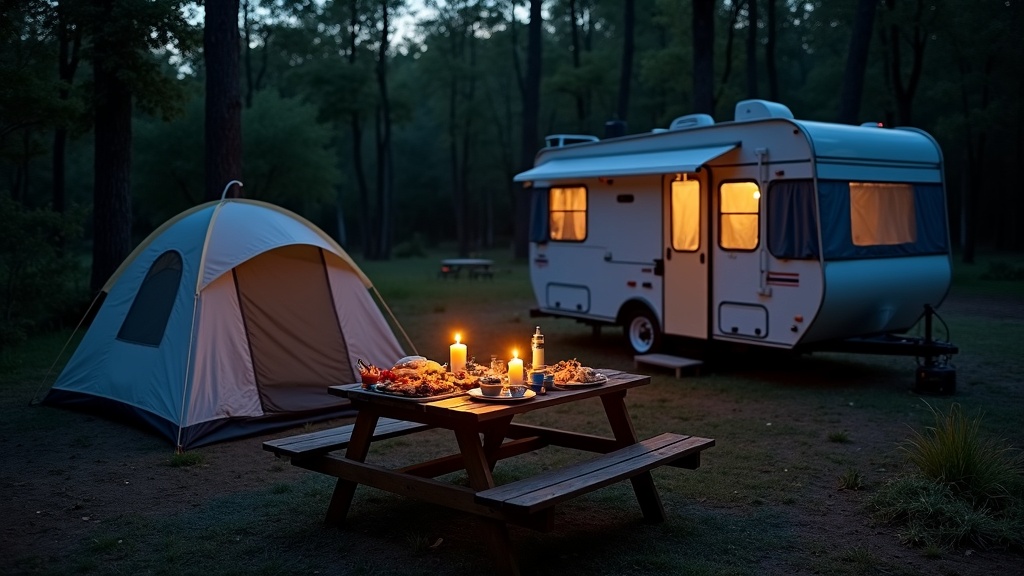Keeping ants and flies out of your tent and RV is one of those crucial moves that can really make or break your enjoyment of time in the great outdoors. Even the most beautiful campsite or perfect road trip can get frustrating if you’re constantly swatting flies away from your breakfast or waking up to a trail of ants in your snacks. Over the years, I’ve tracked down a host of practical tips and tricks that truly work, and I’m eager to share them with you here. Whether you’re a first-timer or a seasoned camper, these strategies will help set you up for a more relaxed and bug-free adventure.

Why Ants and Flies End Up In Tents and RVs
Ants and flies don’t just randomly show up in your tent or RV. They’re attracted by the same things that lure them into your kitchen at home—food, strong smells, and sometimes even just moisture. When you’re camping or parked for the night, these little creatures find your space pretty irresistible. Understanding why they’re drawn in will help you block them out for good.
Ants are on an endless quest for crumbs, sticky spills, and anything sweet. Flies are more interested in strong odors, decomposing leftovers, and anything with a scent. Both types of bugs love finding gaps, holes, and easy entry points. Even simple slips, like leaving a candy wrapper out or a cooler leaking at the edges, can bring about a mini insect invasion.
Best Supplies and Tools to Protect Your Space
If you want to stop ants and flies, you’ll need a few clever supplies on hand. Here are some items that can give a real boost to your pest prevention:
- HeavyDuty Zip Bags and Locking Bins: Always store food and snacks in zipper bags or sealed bins so the odors are safely contained and bugs can’t get to them.
- Screen Mesh for Doors and Windows: Many RVs come with built-in screens, but throwing up extra mesh covers on tent doorways and windows can make a noticeable difference.
- Natural Repellents: I swear by peppermint oil, citronella candles, or even homemade vinegar sprays. They’re easy to pack and super useful for keeping ants and flies at bay.
- Compact Broom and Dustpan: Keeping crumbs swept up inside your RV or tent makes a huge difference, removing what attracts ants in the first place.
- Collapsible Trash Can with Lid: Having a covered trash can is a must—open bags or loose trash are like billboards for bugs.
Step-by-Step Guide to Preventing Bugs from Getting In
It doesn’t take much effort to keep ants and flies from taking over your tent or RV if you follow a basic routine. Here’s the setup I stick with every single trip:
- Inspect and Seal Entry Points: Look closely at your tent or RV for holes at ground level, around zippers, or near vents. A bit of duct tape or a mesh patch over any gap can save you a lot of hassle.
- Keep Food and Drinks Sealed: Anything that smells—snacks, bread, fruit, even drinks—needs to go in a sealed bag or bin. Try not to eat meals inside your tent; it’s easier to clean up outside on a table.
- Clean Up Spills Immediately: Even tiny spills, like a drop of juice on a counter, can attract bugs. I always wipe surfaces with a damp towel and keep biodegradable soap for messier accidents.
- Set Up Your Tent or RV Strategically: Don’t pitch your tent near ant hills, rotting wood, or thick brush. For your RV, park away from dumpsters, standing water, or bug-prone spots.
- Use Repellents Around Entry Points: A dab of peppermint oil or a mist of vinegar spray near doors and zippers works wonders. Pay attention to tent zippers or the steps and vents on your RV.
- Cut Down on Outdoor Lighting: Bright outdoor lights are magnets for flies. Opt for smaller lanterns or yellow-tinted bug bulbs instead of big bright white lights.
These habits will become second nature with time, and you’ll notice a lot fewer critters in and around your space.
Extra Tips for Tents
Tents can be especially tricky since they’re so close to the ground. Even tiny holes are like open doors for ants and flies. Here’s what works for me every time I camp in a tent:
- Lay Out a Tarp or Groundsheet: A tarp under your tent adds a comfort layer and also acts as a shield against bugs. Don’t forget to shake it off before packing it away.
- Keep the Zipper Closed: Even if you run out for just a minute, always close the zipper tight. Flies can zip inside almost before you notice you left it open.
- Hang a DIY Mesh Screen: If you’re relaxing with the tent door open, install a mesh curtain with a magnetic strip. It closes quickly behind you, keeping pests outside.
- Elevate Your Food: Use a tote or hang a stuff sack for food storage instead of setting it on the ground, even with sealed containers. It throws ants off the trail.
If you follow these tricks along with the core steps, your tent nights will be much calmer and comfier.
Special Strategies for RVers
RVs are a little different since there are more cracks, more surfaces, and more food options to tempt bugs. Here’s what I never skip when camping in my RV:
- Window and Door Maintenance: Check and replace weatherstripping and seals often. Even a tiny gap can give ants a way in.
- Check Plumbing Access Points: RV’s vent pipes, drains, and hookups underneath invite bugs. Block them off with foam or mesh—you’ll still get airflow but keep the bugs out.
- Keep Pet Food Stored Safely: Traveling with pets? Use sealed bins for their food and clean up feeding areas right away each time.
- Take Out Trash Often: Even a small trash bag will smell fast in a cozy RV space. Always take out your trash after eating, or at least stash it outside away from doors until you can toss it.
- Park Away from Insect Hotspots: Dump stations and dumpsters are prime real estate for bugs. If you can, pick a spot a decent distance away from obvious bug hangouts.
Common Challenges and How to Fix Them
- Ant Trails on Anchor Cords: Sometimes ants use your tent guy lines or the RV power cables like highways. Smear a little petroleum jelly or wrap sticky tape around trouble spots to disrupt their line.
- Flies Persist Despite Cleaning: If you’re keeping things tidy but still have flies, dig into every hidden nook—look for leaks, fallen food, or missed trash under the camper. Flies are drawn to even the smallest overlooked bits.
- Bugs Attracted to Outdoor Meals: Picnicking is awesome, but bugs love it too. Wipe table legs with citronella or use heavy mesh food covers; both can make a noticeable difference.
- Random Ants or Flies Get In: Even if you’re prepared, the occasional stray will get inside. I keep a tiny hand vacuum and a sticky lint roller to catch them. Soapy water wipes erase their scent trails and clean up quick.
Ant Barriers that Actually Work
Physical ant barriers are especially effective and chemical-free. A few favorites of mine include:
- Draw a chalk line around tent stakes or along RV steps. Ants generally avoid certain minerals found in chalk.
- Use doublesided tape at strategic entry points—ant legs get stuck, halting the invasion before it starts.
- Dust food-grade diatomaceous earth around your tent’s base or RV tires. It’s non-toxic and does a good job against crawling bugs.
Natural Repellents for Flies and Ants
Some scents and easy sprays help you avoid chemical smells and work great in tight camping spaces. Try these options:
- Peppermint Oil: Combine ten drops with water in a spray bottle. Spritz doors, vents, and zippers now and then—you’ll find it works for more than just bugs, too.
- Cinnamon Powder: Sprinkle it at tent or RV entry points and ground-level food storage areas. Ants really dislike the scent.
- Citronella Candles: Place them on picnic tables or near entrance areas. If you have small lantern versions, hang them by the door.
- Apple Cider Vinegar Traps: A cup with a splash of ACV and dish soap attracts flies, but they can’t escape.
Staying Clean Means Fewer Pests
Simple routines go a long way when it comes to keeping bugs away. A five-minute tidy-up before dark—wiping down, sweeping, and tossing out trash—dramatically reduces the insect draw near your tent or RV. Fast treatment of anything sticky or spilled makes a major difference. At heart, ants and flies are just looking for easy meals, so if there’s nothing to find, they’ll move along quickly.
How the Pros Do It: Real-World Camping and RV Examples
- Hanging Food Totes in Bear Country: A trick often used for bears, but equally valuable for keeping pesky ants away. Hang your food bags on a rope between two trees or on a dedicated bear pole if one’s available at your site.
- Portable Screen Rooms: Veteran campers and fulltime RVers love pop-up mesh rooms, especially for eating bug-free by the water or woods in peak season.
- DIY Scent Pouches: Old socks filled with coffee grounds or dried citrus peels work well by entrances or steps as natural bug deterrents. Swap them out often for best effect.
Frequently Asked Questions
You might be wondering about a few common concerns related to bugs in campsites and RV spaces. Here are answers to the top questions I hear from fellow campers:
Question: Will home-use bug sprays or commercial sprays damage my tent or RV’s surfaces?
Answer: Always check the product label and test on a tiny, hidden spot. Some sprays can stain or damage certain fabrics and plastics, especially on mesh screens. Natural options like very diluted peppermint oil are safer bets.
Question: Can electronic bug zappers be used inside tents or RVs?
Answer: Small, battery-powered zappers are fine outside, but inside tents and RVs, stick to screens and natural repellents—zappers might attract more bugs and can be messy indoors.
Question: What foods are least likely to draw ants and flies?
Answer: Snack bars, canned goods, and individually wrapped snacks are less likely to attract bugs than sweet drinks, bread, or fruit. Only open what you’ll eat immediately and keep everything else sealed up tight.
Final Thoughts
Blocking ants and flies from your tent or RV really comes down to smart prep, regular cleanup, and guarding food and entry points. By sealing off gaps, safely storing snacks, and using natural repellents now and then, you’ll notice way fewer pests, and your camping adventure will be all the better for it. If you haven’t tried out these steps, give them a go on your next adventure—chances are, you’ll be pleasantly surprised at just how much more relaxing your campsite or RV can feel. Happy camping, and here’s to bug-free mornings and peaceful evenings outdoors!
